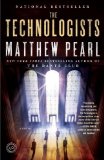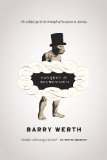Summary | Excerpt | Reading Guide | Reviews | Beyond the book | Read-Alikes | Genres & Themes | Author Bio

Parrot and Olivier in America is a rich, intricate historical novel which places two very different foreigners in the middle of a completely alien society: American democracy in its infancy. Olivier is a spoiled young French aristocrat, a foppish prig unwillingly sent overseas by his worried parents. John Larrit (aka "Parrot") is the talented son of an English engraver, hired ostensibly to be Olivier's servant but in fact sent to keep him out of trouble. These dissimilar characters allow readers to take a step back from what they know of this early period in United States history to experience it from two disparate, contrasting viewpoints, creating a sense of freshness and nostalgia for a more innocent America, the land of opportunity where anything is possible.
Parrot and Olivier in America is loosely based on the life of Alexis de Tocqueville and his seminal work, Democracy in America. Peter Carey does a remarkable job of echoing Tocqueville's opinions without actually quoting him. He uses Olivier's musings to illustrate the genesis and formation of Tocqueville's observations:
"I strolled out on the jetty and peered into the mist and coal smoke... From this spectral effluence appeared the Phoenix, looming high, klaxon loud. On the starboard side, as it drifted silently toward the dock, stood what might have been the emblem of America: frock-coated, very tall and straight, with a high stovepipe hat tilted back from his high forehead. I thought this is the worst vision of democracy - illiterate, hard as wood, overdressed, uncultured, with that physiognomy I had earlier observed in the portrait of the awful Andrew Jackson - a face divided proudly in three equal parts: hairline to eyebrows, eyebrows to nose, lips to chin. In other words, the face of one who will never give any weight to the wisdom of his betters. To see the visage of their president is to understand that the farmer and the mechanic are the lords of the New World. Public opinion is their opinion; the public will is their will."
The book has been referred to as "Dickensian" by many reviewers, and the comparison is apt. The low-key, witty humor Carey imbues in the narrative, the multitude of quirky characters, and reliance on unlikely coincidence to further the plot all evoke the iconic author. And like Dickens's, Carey's novel is about more than the superficial story line; a layer of social commentary is embedded throughout.
In many ways Parrot and Olivier is also a coming of age novel, with each of the two men reaching maturity in the New World. The main characters gradually reverse roles as the novel progresses; Parrot transforms from cynic to idealist, while Olivier moves from innocent to pessimist. Their juxtaposition and metamorphosis form a key part of the plot, and it is masterfully accomplished. Olivier also seems to be a stand-in for a young United States and its experiment in democracy, and while Parrot remains optimistic about the country's prospects, Olivier sardonically predicts a future for it which, in fact, has largely come to pass.
Parrot and Olivier is not a fast read, as considerable narrative is devoted to the main characters' observations and the interpretation thereof. The plot tends to meander a bit and at times gets lost in digressions, tangents and discourse. That's not to say the book is ponderous - it is, in fact, endlessly entertaining - but it wouldn't be considered a page-turner by anyone's standards. It requires concentration and thought from its readers, and is therefore recommended for those in the mood for a more substantial reading experience - think literary steak versus ice cream.
A video interview with Peter Carey from Granta magazine on Vimeo:
![]() This review
first ran in the April 21, 2010
issue of BookBrowse Recommends.
This review
first ran in the April 21, 2010
issue of BookBrowse Recommends.

If you liked Parrot and Olivier in America, try these:

by Matthew Pearl
Published 2012
The acclaimed author of The Dante Club reinvigorates the historical thriller. Matthew Pearl's spellbinding new novel transports readers to tumultuous nineteenth-century Boston, where the word "technology" represents a bold and frightening new concept.

by Barry Werth
Published 2011
In Banquet at Delmonico’s, Barry Werth, the acclaimed author of The Scarlet Professor, draws readers inside the circle of philosophers, scientists, politicians, businessmen, clergymen, and scholars who brought Charles Darwin’s controversial ideas to America in the crucial years after the Civil War.
Your guide toexceptional books
BookBrowse seeks out and recommends the best in contemporary fiction and nonfiction—books that not only engage and entertain but also deepen our understanding of ourselves and the world around us.